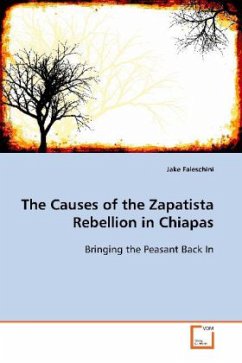This article explores the causes of the Zapatista
rebellion in the state of Chiapas, Mexico on January
1st 1994. The commentary since the uprising has
defined the Zapatistas in a myriad of ways. Many
conflate the original rebellion with the social
movement that followed. This paper brings the
analysis back down to the level of the peasant in
Chiapas, while still considering national and
international influences in the region. It performs
a dual-level comparative analysis in order to
ascertain plausible causes of the rebellion. It
first contrasts the states of Chiapas and neighboring
Oaxaca. It then turns to regions within Chiapas that
supported the Zapatistas and compares them to those
that did not. The paper looks to differences between
the states and regions as plausible causes of the
rebellion. It concludes that the Chiapañecan
peasantry s lack of economic options and autonomy to
organize independent of coercive forces likely caused
the rebellion. In sum, the causes of the Zapatista
rebellion differ little from the causes of traditional peasant rebellions in many other parts
of the world.
rebellion in the state of Chiapas, Mexico on January
1st 1994. The commentary since the uprising has
defined the Zapatistas in a myriad of ways. Many
conflate the original rebellion with the social
movement that followed. This paper brings the
analysis back down to the level of the peasant in
Chiapas, while still considering national and
international influences in the region. It performs
a dual-level comparative analysis in order to
ascertain plausible causes of the rebellion. It
first contrasts the states of Chiapas and neighboring
Oaxaca. It then turns to regions within Chiapas that
supported the Zapatistas and compares them to those
that did not. The paper looks to differences between
the states and regions as plausible causes of the
rebellion. It concludes that the Chiapañecan
peasantry s lack of economic options and autonomy to
organize independent of coercive forces likely caused
the rebellion. In sum, the causes of the Zapatista
rebellion differ little from the causes of traditional peasant rebellions in many other parts
of the world.








